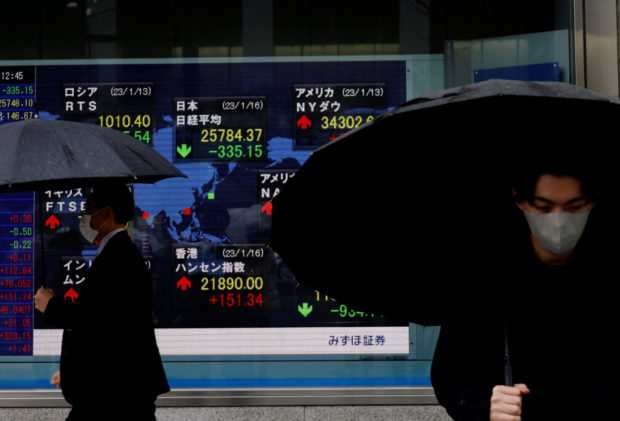
Men walk past an electric board displaying Nikkei and other countries’ indexes outside a brokerage in Tokyo, Japan Jan 16, 2023. The characters on the screen reads,”government bonds”. REUTERS/Kim Kyung-Hoon/File photo
SYDNEY – Asian shares turned lower and the dollar regained some of its footing on Friday, as disappointing earnings from U.S. tech giants undermined sentiment ahead of a key U.S. non-farm payrolls report.
Overnight, markets sensed the end of the massive global tightening cycle, after policymakers in Britain and Europe signalled their intention to pause, sending local bonds rallying and currencies lower.
MSCI’s broadest index of Asia-Pacific shares outside Japan eased 0.5 percent on Friday, dragged down by a 0.9 percent slump in Chinese bluechips and a 1.2- percent tumble in Hong Kong’s Hang Seng index.
Japan’s Nikkei outperformed, rising 0.6 percent.
Disappointment over earnings results from Google, Apple and Amazon tempered sentiment.
S&P 500 futures slid 0.5 percent and Nasdaq futures fell 1.4 percent on Friday, .
Tech shares took a beating in Thursday’s after-hours trading, with shares of Apple, Amazon and Google parent Alphabet all tumbling.
That took the shine off a strong regular trading session on Thursday, when the S&P climbed 1.5 percent and the Nasdaq surged 3.3 percent. The uptick built on strong gains from the previous day after the Federal Reserve Chair Jerome Powell said disinflationary pressures are underway in the economy, raising hopes of an imminent pause to its monetary tightening streak.
Apple projected another revenue decline in the start of the year, Amazon warned that its operating profit could fall to zero in the current quarter, and Google parent Alphabet missed expectations in its fourth-quarter profit and revenue.
Investors are also watching the fallout from this week’s plunge in shares of India’s Adani group, after market losses amounted to more than $100 billion in the wake of a U.S. short-seller’s report.
On Thursday, the European Central bank (ECB) and Bank of England (BoE) hiked rates by 50 basis points each, with the BoE saying the tide was turning against inflation and the ECB indicating at least one more hike was on the horizon before re-evaluating its rate hike path.
Markets reacted by pushing European yields sharply lower, with the ten-year German bunds falling 22.6 basis points to 2.065%, the biggest drop since 2011, and Italian bonds tumbling 40 bps to 3.887%, the most since 2020, on hopes that the tightening from ECB will end soon.
“The wash-up is that the BoE meeting was dovish, and the ECB is now firmly open-minded and data-dependent, and the Fed chose not to fight the market and the market feels validated by that,” said Chris Weston, head of research at Pepperstone.
Alan Ruskin, macro strategist at Deutsche Bank, said given the current market price action ahead of the U.S. payrolls data, a softer report would be regarded as endorsing all the favourite trades of the year.
“Not least it would provide the most important evidence to date to suggest that the market’s rates pricing is more appropriate than the Fed’s own more hawkish signalling,” said Ruskin.
Analysts expect 185,000 jobs were added last month, the lowest since January 2021, unemployment edged up to 3.6%, and hourly wage inflation to stay flat at 0.3 percent on a monthly basis, suggesting the strong labour market might have started to ease up.
Futures markets still favour another 25-basis-point hike from the Fed at its March policy meeting, while implying that might be the end of its current tightening cycle. They have also priced in one rate cut by the end of this year.
In the currency markets, the euro extended losses to $1.0891, pulling further away from the ten-month top of $1.1033 touched on Thursday.
The sterling fell to $1.2206 on Friday, the lowest in more than two weeks, after tumbling 1.2 percent the previous session.
That helped the U.S. dollar to recoup most of its post-Fed losses, with the dollar index now standing at 101.81, away from its nine-month low of 100.80.
Treasury yields held largely steady. The yield on benchmark 10-year Treasury notes eased 2 basis points to 3.3799 percent, while the two-year yield, which rises with traders’ expectations of higher Fed fund rates, was mostly flat at 4.0959 percent.
In the oil market, Brent crude futures rose 0.3 percent to $82.41 while U.S. West Texas Intermediate (WTI) crude also settled up 0.3 percent, at $76.09.
Gold was slightly higher. Spot gold was traded at $1916.1 per ounce.